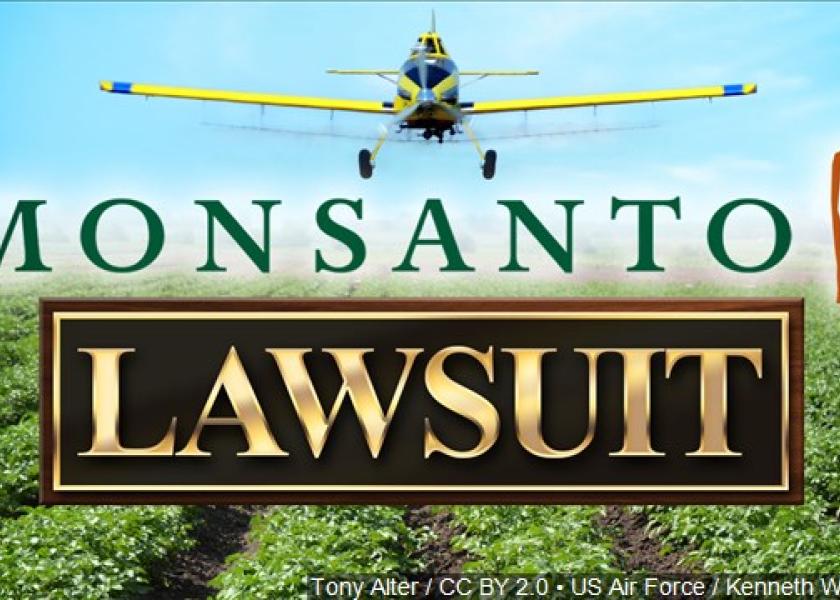Bayer Shares Drop Following Monsanto Cancer Verdict

(Bloomberg) --
Shares of Bayer AG plunged by the most in almost seven years on concern about the potential costs of a protracted legal battle over Roundup weed killer, the cornerstone product of newly acquired Monsanto Co.
Monsanto was socked with $289 million in damages in the first trial over claims that the herbicide causes cancer when former school groundskeeper Lee Johnson prevailed Friday in San Francisco state court. The company, whose market value fell by more than 10 billion euros ($11.4 billion) Monday, says Roundup is safe.
The trial was an important test of the evidence against Monsanto and will serve as a template for litigating thousands of other claims over the herbicide. Bayer closed a deal to buy Monsanto for $66 billion in June. If the litigation generates large verdicts, it could have a material impact on Bayer’s bottom line, said Chris Perrella, an analyst for Bloomberg Intelligence. 
The verdict surprised Bayer investors and may stir up memories of the scandal over cholesterol-lowering pill Lipobay, said Markus Mayer, an analyst with Baader Bank AG. Bayer paid more than $1.1 billion to settle suits over the heart drug.
“Investors might worry that this will become a ‘Lipobay 2.0,’” Mayer said.
Shares of Bayer slumped as much as 12 percent, the most since September 2011, in Frankfurt on Monday. That extended its rout this year to 19 percent. Bayer’s 1.5 billion euros of bonds due in December 2029 plunged 3 cents on the euro to the lowest since the company issued them in June to help pay for the Monsanto acquisition.
Glyphosate, the active ingredient in Roundup, was first approved for use in Monsanto’s weed killer in 1974. While it became the world’s most popular and widely used herbicide, the question of whether it causes cancer has been hotly debated by environmentalists, regulators, researchers and lawyers -- even as Monsanto has insisted for decades that it’s perfectly safe.
“More than 800 scientific studies and reviews -- and conclusions by the U.S. Environmental Protection Agency, the U.S. National Institutes of Health and regulatory authorities around the world -- support the fact that glyphosate does not cause cancer, and did not cause Mr. Johnson’s cancer,” Monsanto Vice President Scott Partridge said in a statement Friday.
The reliance of the U.S. company -- and now, its German acquirer -- on Roundup extends far beyond just selling it as a weed killer. Monsanto genetically engineered the DNA of corn, soybeans and other crops to make them resistant to Roundup; it now makes more revenue from seeds and traits than it does from herbicide.
Jurors awarded Johnson, the groundskeeper, $39 million for his losses and $250 million to punish Monsanto after finding it liable for a design defect and failing to warn of Roundup’s risks. The company said it will appeal.
“The jury’s verdict is just the first step in this case,” Bayer said in a statement on Monday. The German company is due to begin integrating Monsanto’s operations into its own later this month.
Working for a school district in Benicia, California, about 40 miles east of San Francisco, Johnson mixed and sprayed hundreds of gallons of Roundup. He was diagnosed with cancer in 2014, and in July 2017, after chemotherapy and other treatments, his oncologist gave him six months to live.
Johnson’s lawyers argued that his exposure, including accidents that soaked him from head to toe in Roundup, caused his non-Hodgkin’s lymphoma. He was seeking $412 million in damages.
Monsanto May Have Lost, But Pesticide Case Far From Over
Monsanto scientists knew of the cancer risk posed by Roundup as far back as the 1970s, but failed to inform the public and instead engaged in a “deliberate effort to distort the truth” as the weed killer generated hefty returns, Johnson’s lawyer, Brent Wisner, told the jury in closing arguments Tuesday.
“Despite the Environmental Protection Agency’s failure to require labeling, we are proud that an independent jury followed the evidence and used its voice to send a message to Monsanto that its years of deception regarding Roundup is over and that they should put consumer safety first over profits,” Wisner said in a statement after the verdict.
Monsanto argued that the type of cancer Johnson contracted takes many years to form. The short period between Johnson’s first exposure in 2012 and his diagnosis in 2014 made any connection between his contact and the disease impossible, according to the company.
“They’re going to appeal, and we’re going to have to see what happens then,” said Ulrich Huwald, an analyst with Warburg Research in Hamburg. Even if Bayer doesn’t face similar verdicts in other cases, the company may need to pay out settlements. “As the northern Germans say, ‘In court and on the high seas, you’re in God’s hands.’”
Copyright 2018, Bloomberg







